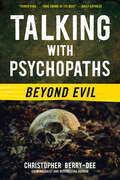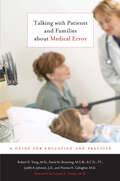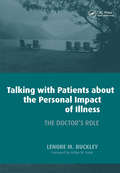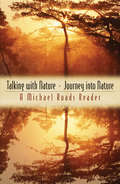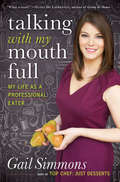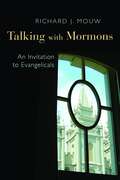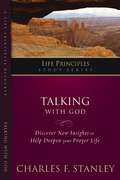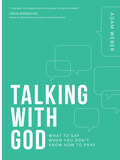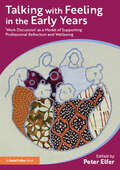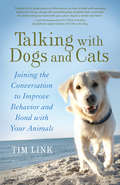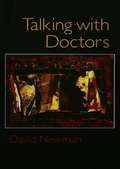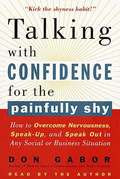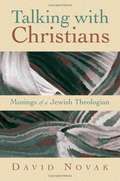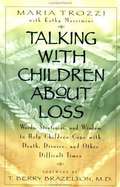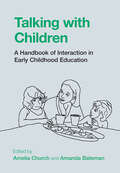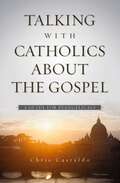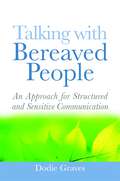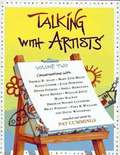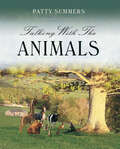- Table View
- List View
Talking with Psychopaths: Mass Murderers and Spree Killers (Talking with Psychopaths)
by Christopher Berry-DeeBestselling true-crime author Christopher Berry-Dee's latest book tackles the heavy crime of people who randomly kill large numbers of others (spree killers) and those who set out to do so in specific places or situations (mass killers). As such killings become more frequent, the ready availability and ease of obtaining firearms and weak backgrounds checks in the United States inevitably lends to many of these cases, but there have been other recent examples in the United Kingdom, New Zealand, and Norway, where extremely robust firearms legislation could not stop these horrific crimes. What is more difficult to establish is the motivation behind such killings. Some are occasioned by grievance, real or imagined, while others have their origins in a sense of failure or feelings of inadequacy, yet others seem to be driven by a desire for power over their fellow humans, often coupled with an overriding contempt for the lives of others. In a search for answers, Christopher Berry-Dee offers case studies in some of the most infamous mass killings of the past fifty years, from school massacres to workplace killings, hate crimes to familicides. But is the awful truth that such murderers are almost impossible to predict and therefore almost impossible to prevent? Dig in and find out.
Talking with Psychopaths: Letters from Serial Killers (Talking with Psychopaths)
by Christopher Berry-DeeWhat is it like to write letters to a serial killer? What tactics does an investigator use to get an interview with a monster? What do these killers, locked behind bars, have to say? See for yourself? Talking with Psychopaths: Letters from Serial Killers is the unique study of criminals in their own words based on bestselling true crime author and criminologist Christopher Berry-Dee’s extensive interviews with convicted serial murderers. Step inside the mind of The Genesee River Killer, The Death Row Teddy, The Ice Queen, The Want-ad Killer, The Moors Murderer, The Amityville Horror, The I-95 Killer, and more. This rare collection has Berry-Dee at his steeliest best, exploring the downright creepy correspondence with murderers, serial killers, and psychopaths, with exclusive scans of letters and eerily decorated envelopes. A must-have for fans of the Talking with Serial Killers and Talking with Psychopaths series, a collection that will be bequeathed to the FBI’s Behavioral Analysis Unit at its headquarters in Quantico, Virginia.
Talking with Psychopaths: A Journey into the Evil Mind (Talking with Psychopaths)
by Christopher Berry-DeeFor decades, renowned criminologist Christopher Berry-Dee has interviewed imprisoned, infamous serial killers and now he peels back the curtain, engaging with the psychiatrists tasked to understand their deviant minds. As Berry-Dee dives deeper than ever before, he uncovers a disturbing pattern: the utter lack of remorse displayed by these individuals is often more horrifying than the crimes they&’ve committed. Even more alarming, psychoanalysts admit that these murderers have an insidious ability to mask their true nature behind a facade of normalcy. Their behavior defies comprehension, even to the professionals who spend their livelihoods studying these aberrant minds. With gripping narrative and a wealth of research, Talking with Psychopaths: A Journey into the Evil Mind analyzes the darkest corners of the human brain. As Berry-Dee recounts his interviews, he exposes each layer of deception, seeking the best path to find the truth behind a psychopath&’s mask.
Talking with Psychopaths: Beyond Evil (Talking with Psychopaths)
by Christopher Berry-DeeBestselling author Christopher Berry-Dee returns with a companion volume that delves even deeper into the evil world of psychopaths and their hideous crimes. In Talking with Psychopaths: Beyond Evil, criminologist Berry-Dee combines sections on killers whom he has known, interviewed, or corresponded with, with studies of psychopathic serial killers from the past, including Peter Kurten, the Dusseldorf Monster; John Christie, a murderer and necrophile; and Neville Heath, a ladykiller in every sense of the word. The result is a chilling narrative that sets the forensic examination of killers and their crimes within the context of murder in the 20th and 21st centuries, and the insoluble problem of identifying these psychopaths. This is not a book for the squeamish but is undeniably fascinating in its portrayal of just what one human being will do to another—while all too often moving among us unnoticed and unhindered. If their crimes seem as incomprehensible as they are horrific, it is undeniably true that the world’s most wicked killers may be much closer than we think.
Talking With Poets
by Harry ThomasThe five interviews in this book were conducted by students in “The Art of Poetry,” a course that Harry Thomas taught for several years. The students’ depth of knowledge and keenness of insight into the poets’ work is an affirmation of American education. The poets respond to the students with a frankness and feeling of fraternity that mounts at times to a sort of communion. The poets take up a great range of matters in the interviews the nature of artistic creation, the varieties and difficulties of poetic translation, poetry and politics, religion, popular culture, the contemporary readership for poetry, and the experience of living as a poet in a country not your own. They speak with familiarity and enthusiasm of a number of writers, including Eliot, Joyce, Rilke, Brodsky, Pound, Ovid, Dante, Ralegh, Wordsworth, Keats, Mandelstam, and Wilde. One of the delights of reading these interviews is to observe the poets responding to the same matter for instance, Seamus Heaney speaking of Robert Pinsky’s translation of Czeslaw Milosz’s great poem, “The World,” and Robert Pinsky speaking at length of Seamus Heaney’s essay, in The Government of the Tongue, on Pinsky’s translation. This is an intimate look into the minds of five of our most celebrated contemporary poets and an invigorating meditation on some of our most human concerns.
Talking with Patients and Families about Medical Error: A Guide for Education and Practice
by Robert D. Truog David M. Browning Judith A. Johnson Thomas H. GallagherMore than a million patient safety incidents occur every year, and medical error is the third leading cause of death in the United States. Illuminating the experiences of those affected by medical error—patients, their loved ones, and physicians and other medical professionals—Talking with Patients and Families about Medical Error delves deeply into the challenges of communicating honestly and openly about mistakes in medical practice.ccBased on guidelines from the Institute for Professional and Ethical Practice and the authors' own experiences, the practice-based approaches outlined here offer concrete guidance on• initiating discussions • dealing professionally and compassionately with patients' reactions • who should be included in the conversation• what information should be documented in the medical record• how to respond to questions about financial compensationAimed at promoting resolution and healing, this book stresses the importance of clear, empathetic communication that will improve clinical and organizational responses to medical missteps and mismanagement. It emphasizes five features of the physician-patient relationship deserving of special attention: transparency, respect, accountability, continuity, and kindness (TRACK). Narrative examples of common situations demonstrate how conversations about medical error can lead to healing.
Talking with Patients About the Personal Impact of Ilness: The Doctor's Role
by Leonore Buckley Dennis J. ShaleThis book explores the psychosocial impact of serious illness - its effect on a person's identity and relationships - and the doctor's role in counseling patients. Even the most seasoned physician often feels inadequate when it comes to discussing the personal impact of disability and serious illness with patients. It takes time, attention, and skill. Most physicians who are good at this learn what to say from observations of physicians they respect and the conversations they share with patients over many years of practice. Like everything else in medicine, there is a continuous learning curve. This book offers a beginning. It includes first-hand experiences and reflections on serious illness by physicians and patients, concrete advice on how to initiate discussions of difficult psychosocial issues, topics for organising discussion, suggested readings, and guides for patient interviews.'Much is written about patient-centered care and the patient experience.What sets this book apart is, first, Lenore Buckley's ability to tell stories about her own medical experience. These teaching tales give young physicians a sense of the task that their profession requires of them, while keeping that task within human proportions. Second and complementing that is her excellent compilation of quotations and stories from the memoirs of patients and physicians, especially physicians as patients. 'I hope this empathic, useful collection of materials for teaching and reflection finds its way into medical school curricula, and I hope it is one of those books that physicians return to during years of practice, especially when they sense that the treatment expert is crowding the witness out of the room. Patients need both doctors. Lenore Buckley shows how doctors are able to expect nothing less of themselves' - Arthur W Frank in the Foreword.
Talking with Nature and Journey into Nature
by Michael RoadsMichael Roads had always been close to nature, but when a river started talking to him, he began to doubt his sanity. A series of encounters with the natural world followed, and Roads began to listen and let go. He found himself led stage by stage to a final wisdom, remarkable in its simplicity and in its message of hope for humanity. This book, a bind-up of his two best-known works, beautifully articulates that message.
Talking with My Mouth Full: My Life as a Professional Eater
by Gail SimmonsWhen Top Chef judge Gail Simmons first graduated from college, she felt hopelessly lost. All her friends were going to graduate school, business school, law school . . . but what was she going to do? Fortunately, a family friend gave her some invaluable advice-make a list of what you love to do, and let that be your guide. Gail wrote down four words:Eat. Write. Travel. Cook.Little did she know, those four words would become the basis for a career as a professional eater, cook, food critic, magazine editor, and television star. Today, she's the host of Top Chef: Just Desserts, permanent judge on Top Chef, and Special Projects Director at Food & Wine magazine. She travels all over the world, eats extraordinary food, and meets fascinating people. She's living the dream that so many of us who love to cook and eat can only imagine. But how did she get there?Talking with My Mouth Full follows her unusual and inspiring path to success, step-by-step and bite-by-bite. It takes the reader from her early years, growing up in a household where her mother ran a small cooking school, her father made his own wine, and family vacation destinations included Africa, Latin America, and the Middle East; through her adventures at culinary school in New York City and training as an apprentice in two of New York's most acclaimed kitchens; and on to her time spent assisting Vogue's legendary food critic Jeffrey Steingarten, working for renowned chef Daniel Boulud, and ultimately landing her current jobs at Food & Wine and on Top Chef. The book is a tribute to the incredible meals and mentors she's had along the way, examining the somewhat unconventional but always satisfying journey she has taken in order to create a career that didn't even exist when she first started working toward it. With memorable stories about the greatest (and worst) dishes she's eaten, childhood and behind-the-scenes photos, and recipes from Gail's family and her own kitchen, Talking with My Mouth Full is a true treat.
Talking with Mormons: An Invitation to Evangelicals
by Richard J. MouwFor over a decade Fuller Seminary president Richard Mouw has participated in Mormon-evangelical dialogue with a view to developing a better understanding between the two groups. His participation in these discussions has drawn severe criticism and even anger from people who believe such talks are pointless or even dangerous. This brief, highly accessible book is his answer. Advocating humility, patience, and a willingness to admit our own shortcomings, Mouw shows why it is necessary to move beyond stark denunciation to a dialogue that allows both parties to express differences and explore common ground. Without papering over significantly divergent perspectives on important issues like the role of prophecy, the nature of God, and the creeds, Mouw points to areas in which Mormon-evangelical dialogue evidences hope for the future. In so doing, he not only informs readers but also models respectful evangelical debate.
Talking with God: Talking With God Through Prayer (Life Principles Study Series)
by Charles StanleyTrue communication with God is more than talking to God, it's talking with God-through prayer. Prayer that involves speaking and listening. In Talking with God, Charles Stanley discusses the general principles that are basic to everyone's prayer life, explaining how your prayers can lead to a more intimate than a relationship with God and how you can encourage others in their own prayer lives. The Life Principles Study Guides are perfect companions to Dr. Stanley's Life Principles Bible or for use on their own. They are a unique approach to Bible study, incorporating biblical truth, personal insights, emotional responses, and a call to action. Whether you use a study in a group or as an individual, it will help you get in touch with the Bible, God, and yourself.
Talking with God: What To Say When You Don't Know How To Pray
by Adam WeberLife is crazy. Prayer is simple. Prayer seems like it should be so simple. Yet when it comes to actually praying, it often feels awkward and complicated. I mean, what should you actually pray about? What do you say? Is there anything you should or shouldn’t say? Do you have to speak out loud? Where do you even start? To make matters worse, we’ve heard about prayer for so long that we feel awkward asking about it. It’s like having to ask a person’s name after knowing them for years. We’re embarrassed to ask because we really should know their name by now. Then comes the reality and craziness of life. Between work, parenting, walking the dog, a full inbox, keeping up on social media—who has time to pray? The truth is, prayer is simple. It’s like talking; talking with a good friend. Here’s the best part: No matter where we are in life, God can’t wait to talk with us. What does it look like to pray in the midst of your life? What do you say when you don’t know how to pray? I’m asking the same questions. Let’s talk.
Talking with Feeling in the Early Years: ‘Work Discussion’ as a Model of Supporting Professional Reflection and Wellbeing
by Peter ElferEarly years pedagogy is a deeply human, emotional activity as well as an intellectual and physical one. Drawing on key research, this book explores how ‘Work Discussion’ can offer a safe space for practitioners to reflect on their daily experience including the feelings that accompany the work. In facilitating honest and open conversations, it shows how sharing troubling dilemmas and experiences in a supportive environment can improve both the wellbeing of practitioners and the outcomes for children and their families. This book explains the origins of Work Discussion, the results of a year-long evaluation of its impact in a large early years setting, and the accounts of five nursery leaders who have experienced using Work Discussion. Concluding with practical advice on preparing to go forward for training in facilitating Work Discussion groups in early years settings, chapters cover: How to set up Work Discussion as a model of professional reflection Structuring conversations and responding to difficult incidents and experiences The benefits of Work Discussion for practitioners, children and families Detailed case studies of Work Discussion in action. Written by leading experts and including reflective questions throughout, this will be valuable reading for early years practitioners as well as managers wanting to support their staff’s mental health wellbeing.
Talking with Dogs and Cats
by Tim LinkAnimal lovers often wonder what the meow, bark, tweet, or stare of their pet means. Why the incessant meowing after Kitty has been fed, petted, and played with? Why is Fido barking up such a storm or digging as if his life depended on it? Pet owners want to know, and Tim Link, an expert animal communicator, teaches readers how to find out. The author was surprised to find himself communicating with the pets of family and friends. Because Link was caught off guard by his own gift, he is adept at helping readers first hone their communication skills, using the spoken and the visual, and then focus on particular behaviors. Unlike most "training” methods, Link’s approach respects the personality and feelings of animals. His methods, which are simple and accessible to all, facilitate the understanding that all animal lovers crave.
Talking with Doctors
by David NewmanWithout any warning, in September 1999, David Newman was told he had a rare and life-threatening tumor in the base of his skull. In the compressed space of five weeks, he consulted with leading physicians and surgeons at four major medical centers. The doctors offered drastically differing opinions; several pronounced the tumor inoperable and voiced skepticism about the effectiveness of any nonsurgical treatment. Talking with Doctors is the story of Newman's efforts, at a time of great stress and even impending death, to wend his way through the dense thicket of medical consultations in search of a physician and a treatment that offered the possibility of survival. It is the story, especially, of the harrowing process of assessing conflicting "expert" opinions and, in so doing, of making sense of the priorities, personalities, and vulnerabilities of different doctors. All too often, he found, the leading specialists to whom he was sent were strangers in the consulting room-and strangers who became stranger still, both cognitively and emotionally, when ambiguous findings pushed them to the outer limits of their training and experience. Newman writes poignantly of his sense of powerlessness and desperation, of the painstaking means by which he ascertained what could be known about his tumor, and of the fortuitous events that finally led him to life-saving help. Talking with Doctors is a compelling, absorbing, unsettling story that touches a collective raw nerve about the experience of doctors and medical care when life-threatening illness leads us to subspecialists at major medical centers. Probing the nature of medical authority and the grounds of a trusting doctor-patient relationship, Newman illuminates with grace and power what it now means for a patient to participate in life-and-death medical decisions.
Talking with Confidence for the Painfully Shy
by Don Gabors much about "speaking in public" as it is about "public speaking, " Talking with Confidence for the Painfully Shy can help even the most shy person speak up and speak out in any business or social situation.
Talking with Christians: Musings of a Jewish Theologian
by David NovakBack Cover: In Talking with Christians, "David Novak's compelling reflections explore the central theological concerns of Judaism and Christianity and provide a unique Jewish perspective on Jewish-Christian dialogue. Novak ranges broadly over what matters most in interfaith discussion, including the nature of revelation and the methods of a true theological dialogue that does not slip into relativism. Alongside searching studies of such great Christian theologians as Thomas Aquinas, Karl Barth, and Paul Tillich, Novak offers empathetic treatments of contemporary issues, including the controversial canonization of Jewish convert Edith Stein and the moral crisis of the West after the Holocaust. His Talking with Christians is a significant sign of hope for all people of faith who recognize the need to learn from one another. "For those readers who disagree with some of the author's arguments and conclusions, his discussions allow people to crystallize their own thinking and gain insight into someone who thinks differently. Novak's musings might cause both those who disagree and agree to continue the author's discussions with others to bring about understanding of important issues in today's world.
Talking with Children About Loss: Words, Strategies, and Wisdom to Help Children Cope with Death, Divorce, and Other Difficult Times
by Maria TrozziThrough captivating stories and thoughtful analysis, Maria Trozzi explains how to handle the difficult job of talking with children and adolescents about loss, with discussions about: * How children perceive and interpret events such as death, disability, and divorce * Guiding children through the four tasks of mourning * Helping children face funerals, wakes, and memorial services * Children's fears and fantasies: how they express them, and how to address them * Age-appropriate responses to children's questions and concerns * Talking to children about long-term illness, suicide, family or community tragedy, and other special situations * What to do when children won't talk about loss, and when to seek professional help
Talking with Children: A Handbook of Interaction in Early Childhood Education
by Amelia Church Amanda BatemanEarly childhood teachers know that the quality of child-teacher interactions has an impact on children's social and educational outcomes. Talking with children is central to early learning, but the significant details of high quality conversations in early childhood settings are not always obvious. This Handbook brings together experts from across the globe to share evidence of teachers talking with children in early learning environments. It applies the methodology of conversation analysis to questions about early childhood education, and shows why this method of studying discourse can be a valuable resource for professional development in early childhood. Each chapter of this Handbook includes an up-to-date literature review; shows how interactional pedagogy can be achieved in everyday interactions; and demonstrates how to apply this learning in practice. It offers unique insights into real-life early childhood education practices, based on robust research findings, and provides practical advice for teaching and talking with children.
Talking with Catholics about the Gospel: A Guide for Evangelicals
by Christopher A. CastaldoIn Talking with Catholics about Jesus, author Chris Castaldo provides an easy-to-follow introduction to basic Catholic belief and practice, equipping evangelical Protestants for more fruitful spiritual conversations. Written in accessible, non-technical language, this short book offers readers: A more informed awareness of Catholicism Encouragement to move from a combative posture to a gracious one Clarification of erroneous caricatures of Catholics in favor of a more constructive understanding Based in part on Castaldo's experience as a Catholic and time spent working professionally in the Catholic Church, Talking with Catholics about Jesus gives readers a framework for recognizing where lines of similarity and difference fall between Catholics and evangelical Protestants, along with handy tips for engaging in spiritual discussions. Readers will gain encouragement and practical insights for gracious and worthwhile discussions of faith with Catholic believers.
Talking with Bereaved People
by Dodie GravesIt can be hard to know what to talk about with a bereaved person over a period of time once you have offered your condolences. This book shows how, by using good active listening skills, empathic exploration and a willingness to talk about the hard issues, you can embark on a process of sensitive conversation that helps the bereaved person to come to terms with their grief. Dodie Graves outlines a practical framework of six elements for conversing with bereaved people in a structured but flexible way that avoids prescriptive instructions. The elements include talking about the story of the deceased, their relationship with the person, celebrating their life, discussing their legacy, strategies for coping and thinking about the journey undertaken. She shows how to use the elements in conversations with individuals and groups, and for each element suggests creative activities and open questions that can be used, provides anecdotes and case vignettes, and gives a brief summary of the theory pertinent to each stage of the conversation. Talking with Bereaved People is an approachable tool for anyone working with bereaved people, including counsellors, voluntary bereavement agencies, church pastoral teams, hospice and hospital staff, trainers and social workers.
Talking with Artists
by Pat CummingsDistinguished picture book artists talk about their early art experiences, answer questions most frequently asked by children, and offer encouragement to aspiring artists.
Talking With The Animals
by Patty SummersA skilled animal communicator reveals the inner world of dogs, cats, horses, and other creatures—and how humans can understand them more deeply.Animals are talking to us all the time. Patty Summers listens and understands. A renowned animal communicator, Summers can converse directly with a variety of animal species, from cats and dogs to rabbits, horses, and iguanas. In this beautiful and moving book, the animals share their wisdom, their perspective on life, and even how they feel about human beings.The animals can teach us many things, and Summers uses her abilities to help humans listen, as well as to aid humans and animals in understanding one another better. She also describes the ways that animals comprehend the world, and explains that they always understand the intent of human communications, if not the words. And she teaches that they share our wants and needs, as they desire the same things that humans do—love, compassion, kindness, and respect—and they do not want to be thought of as pets or as beings to be exploited.Summers shares numerous encounters with animals, and each story has a valuable lesson. Each is a gift of spirit from the animals. We have so much to learn from our animal companions, domestic and otherwise. Talking with the Animals provides a rare glimpse inside the minds of the creatures with whom we share our planet.
Talking with Angels of Wealth: Receive Their Blessings
by Amanda HartAmanda Hart was rescued by guardian angels as a child and from thence on they became a beacon of hope throughout her turbulent journey into womanhood. The illuminating conversations she has with her angels remain an important aspect of her everyday life, bringing her continual support and spiritual fulfillment. She now dedicates her life to helping others connect with their own angels, helping them to find deeper meaning and happiness in their lives.
Talking with Angels of Wealth: Receive their blessings
by Amanda HartAmanda Hart was rescued by guardian angels as a child and from thence on they became a beacon of hope throughout her turbulent journey into womanhood. The illuminating conversations she has with her angels remain an important aspect of her everyday life, bringing her continual support and spiritual fulfillment. She now dedicates her life to helping others connect with their own angels, helping them to find deeper meaning and happiness in their lives.From the author of Talking with Angels of Light comes another empowering and life-altering book. Amanda Hart's connection with her guardian angels has taught her how to unlock her power, purpose and voice when it comes to financial matters. By following practical exercises, meditations and reading real-life anecdotes this book will guide you towards a healthy, revitalised relationship with money.



